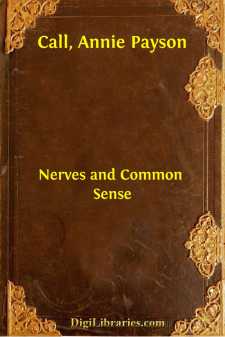Categories
- Antiques & Collectibles 13
- Architecture 36
- Art 48
- Bibles 22
- Biography & Autobiography 813
- Body, Mind & Spirit 142
- Business & Economics 28
- Children's Books 17
- Children's Fiction 14
- Computers 4
- Cooking 94
- Crafts & Hobbies 4
- Drama 346
- Education 46
- Family & Relationships 57
- Fiction 11829
- Games 19
- Gardening 17
- Health & Fitness 34
- History 1377
- House & Home 1
- Humor 147
- Juvenile Fiction 1873
- Juvenile Nonfiction 202
- Language Arts & Disciplines 88
- Law 16
- Literary Collections 686
- Literary Criticism 179
- Mathematics 13
- Medical 41
- Music 40
- Nature 179
- Non-Classifiable 1768
- Performing Arts 7
- Periodicals 1453
- Philosophy 64
- Photography 2
- Poetry 896
- Political Science 203
- Psychology 42
- Reference 154
- Religion 513
- Science 126
- Self-Help 84
- Social Science 81
- Sports & Recreation 34
- Study Aids 3
- Technology & Engineering 59
- Transportation 23
- Travel 463
- True Crime 29
Nerves and Common Sense
Categories:
Description:
Excerpt
CHAPTER I
PEOPLE form habits which cause nervous strain. When these habits have fixed themselves for long enough upon their victims, the nerves give way and severe depression or some other form of nervous prostration is the result. If such an illness turns the attention to its cause, and so starts the sufferer toward a radical change from habits which cause nervous strain to habits which bring nervous strength, then the illness can be the beginning of better and permanent health. If, however, there simply is an enforced rest, without any intelligent understanding of the trouble, the invalid gets "well" only to drag out a miserable existence or to get very ill again.
Although any nervous suffering is worth while if it is the means of teaching us how to avoid nervous strain, it certainly is far preferable to avoid the strain without the extreme pain of a nervous breakdown.
To point out many of these pernicious habits and to suggest a practical remedy for each and all of them is the aim of this book, and for that reason common examples in various phases of every-day life are used as illustrations.
When there is no organic trouble there can be no doubt that defects of character, inherited or acquired, are at the root of all nervous illness. If this can once be generally recognized and acknowledged, especially by the sufferers themselves, we are in a fair way toward eliminating such illness entirely.
The trouble is people suffer from mortification and an unwillingness to look their bad habits in the face. They have not learned that humiliation can be wholesome, sound, and healthy, and so they keep themselves in a mess of a fog because they will not face the shame necessary to get out of it. They would rather be ill and suffering, and believe themselves to have strong characters than to look the weakness of their characters in the face, own up to them like men, and come out into open fresh air with healthy nerves which will gain in strength as they live.
Any intelligent man or woman who thinks a bit for himself can see the stupidity of this mistaken choice at a glance, and seeing it will act against it and thus do so much toward bringing light to all nervously prostrated humanity.
We can talk about faith cure, Christian Science, mind cure, hypnotism, psychotherapeutics, or any other forms of nerve cure which at the very best can only give the man a gentle shunt toward the middle of the stream of life. Once assured of the truth, the man must hold himself in the clean wholesomeness of it by actively working for his own strength of character from his own initiative. There can be no other permanent cure.
I say that strength of character must grow from our own initiative, and I should add that it must be from our own initiative that we come to recognize and actively believe that we are dependent upon a power not our own and our real strength comes from ceasing to be an obstruction to that power. The work of not interfering with our best health, moral and physical, means hard fighting and steady, never-ending vigilance....
















